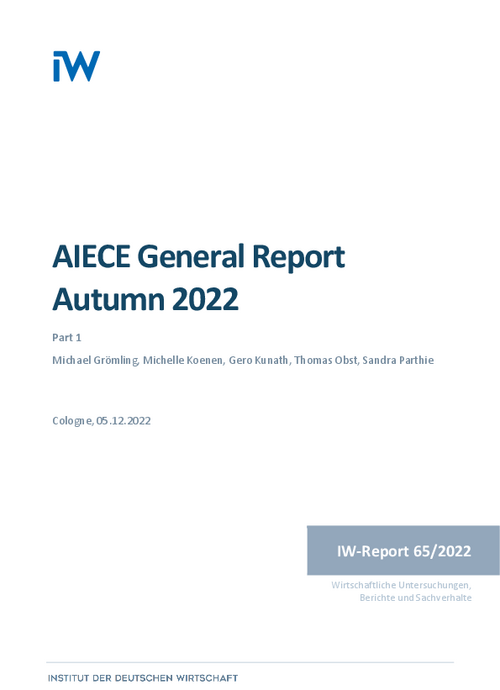Private households, companies and governments in Europe are facing enormous challenges. First, far-reach-ing transformations in economic life are on the horizon for the current decade and beyond. Demographic developments are exacerbating the shortages of skilled workers that already exist in many economies and reinforcing the associated obstacles to production.

AIECE General Report Autumn 2022 - Part I

Private households, companies and governments in Europe are facing enormous challenges. First, far-reach-ing transformations in economic life are on the horizon for the current decade and beyond. Demographic developments are exacerbating the shortages of skilled workers that already exist in many economies and reinforcing the associated obstacles to production.
Climate change requires fundamental societal and eco-nomic changes. Technological progress and the many dimensions of digitalisation are putting business mod-els across all sectors under considerable pressure to modernise. And last but not least, the efficiency and productivity potentials that we have been accustomed to for a long time can obviously no longer be reaped from more intensive international cooperation.
Second, the pandemic and the war in Ukraine are creating additional and unprecedented adjustment burdens in many countries. The Corona pandemic was accompanied by immense strains on the supply and demand side of the economy: Production processes were widely disrupted by missing workers and disrupted supply networks. Demand came to a standstill as a result of lockdowns – especially in the personal ser-vices sectors. With the continuing success of vaccination against Corona, consumption and exports returned to normal. However, global supply networks are still not running smoothly. Production and logistics are still affected by the pandemic. As a result, investment activity has failed to return to pre-crisis levels.

AIECE General Report Autumn 2022 - Part I

More on the topic
![[Translate to English:] Das Gebäude des Weißen Hauses in Washington, D.C. in den Vereinigten Staaten von Amerika. [Translate to English:] Das Gebäude des Weißen Hauses in Washington, D.C. in den Vereinigten Staaten von Amerika.](/fileadmin/_processed_/c/1/csm_GettyImages-2161499385_White_House_Editorial_884306add8.jpg)
Trump or Harris or ...? What Europe must prepare for
A few months before the presidential election in the USA, Donald Trump has a good chance of being re-elected. On the Democratic side, the incumbent president has withdrawn his candidacy after a long period of hesitation, while Vice President Kamala Harris is ...
IW
Compendium 5.5: CO2 Regulation of Road Transport in Europe
With the Compendium CO2 Regulation in Europe, the IW has been providing the interested public with a comprehensive collection of data on the development of CO2 emissions from passenger car traffic in the European Union, as well as on the applicable regulatory ...
IW